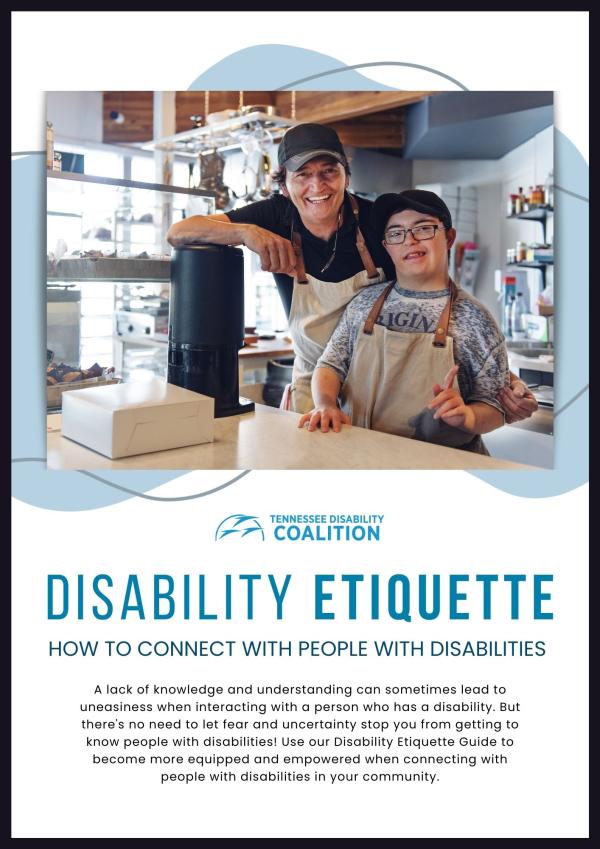
Disability Etiquette Guide:
People with disabilities are just like everyone else. We deserve dignity, respect, and the opportunity to be treated equally. But sometimes it can be difficult to know how to interact with people with disabilities if you lack experience.
The Tennessee Disability Coalition's Disability Etiquette Guide is to help equip and empower everyone; whether you're a part of the disability community or not. Because the way we speak about, and to, people with disabilities matters.
Our Disability Etiquette Guide is a great introduction to our diverse community, not a comprehensive list of what to do when interacting with people with disabilities. Inside you'll find helpful guidelines to keep in mind as you navigate interactions with people with disabilities in everyday life. Don't let the fear of striking out stop you from getting to know us…because people with disabilities are pretty cool!
Download our Disability Etiquette Guide for Free:
Download the Text-Only Version
Download the Large Print Version
Download the PDF Version in Spanish
Download the Text-Only Version in Spanish
*Braille copies are available upon request.
To request hardcopies, follow this link to fill out our order form.
- For TDC Members, we will send your organization 10 FREE copies at no cost. For additional quantities, we ask that you help us cover the cost at $1.25 per copy.
- For Non-Members, we ask that you help us cover the cost at $1.50 per copy. If you’re interested in becoming a TDC Member, follow this link to learn more.
If you have questions or need help filling out the form, email Hannah at hannah_k@tndisability.org.
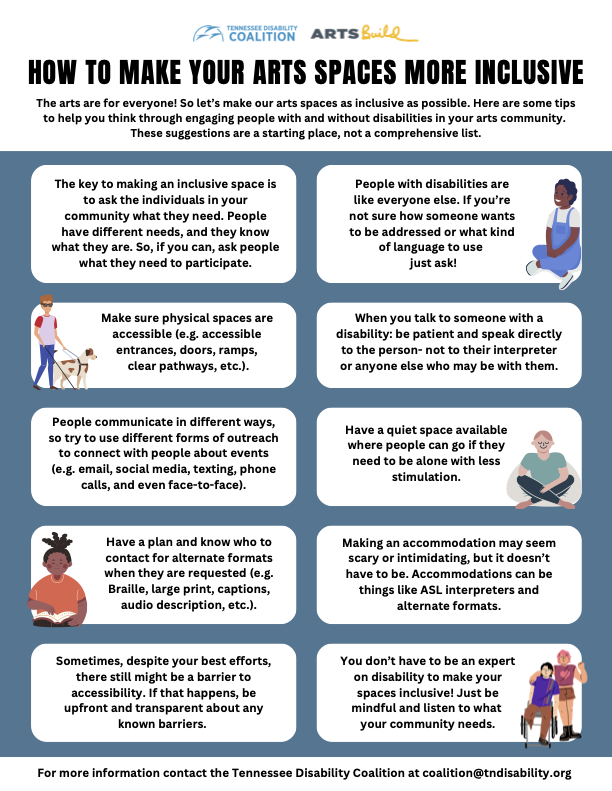 How to Make Your Arts Spaces More Inclusive
How to Make Your Arts Spaces More Inclusive
The arts are for everyone! So let’s make our arts spaces as inclusive as possible. Here are some tips to help you think through engaging people with and without disabilities in your arts community.
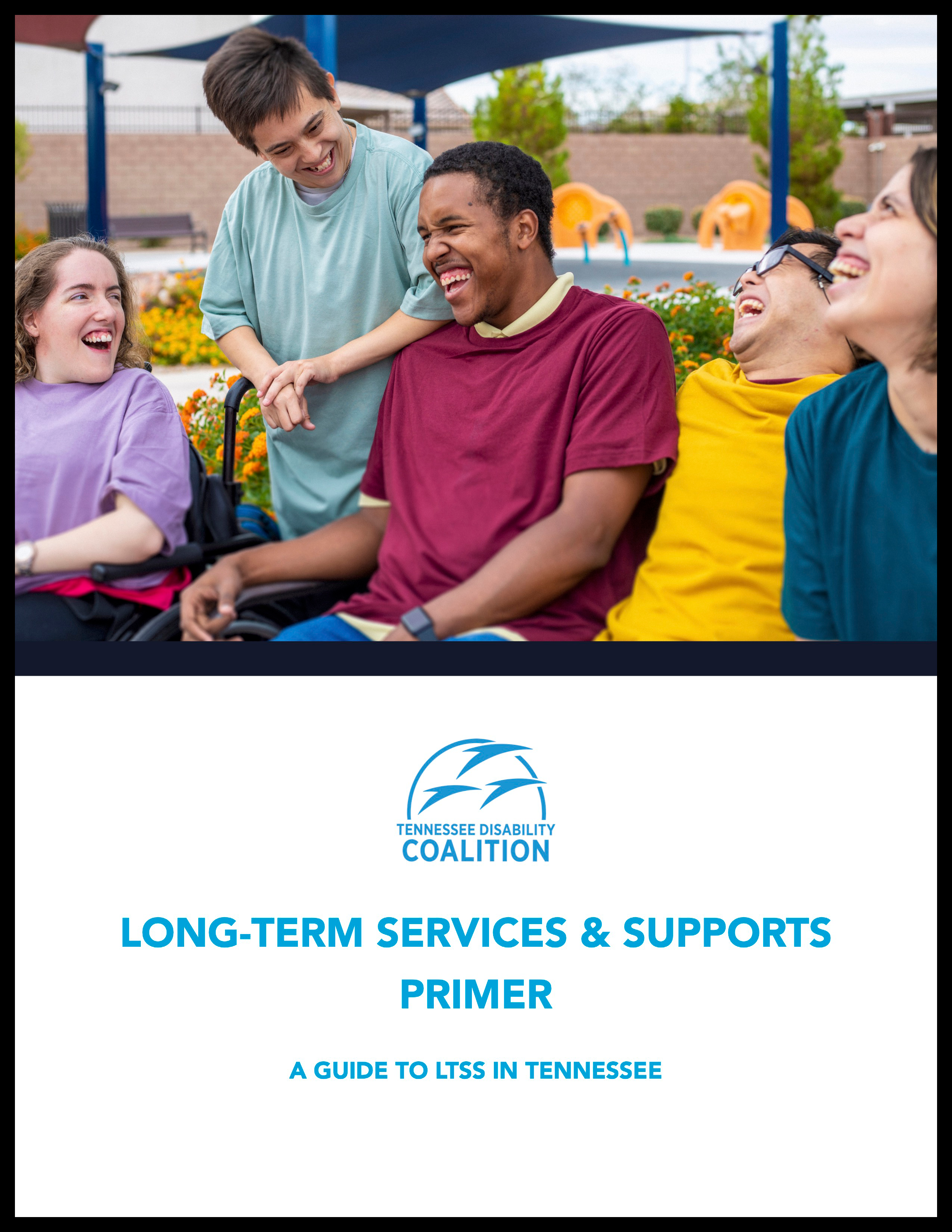 A Guide to Long-Term Services and Supports in Tennessee
A Guide to Long-Term Services and Supports in Tennessee
Nearly one in three Tennesseans lives with a disability. Some of these individuals need assistance with activities of daily living, others may need help with transportation and still others may need support for housing or employment. These types of support allow Tennesseans with disabilities to live in their communities, to be included in our society and to lead lives of their choice.
To provide this help, the state of Tennessee offers Long-Term Supports and Services (LTSS) programs. Tennessee’s LTSS offerings are part of several Medicaid waivers that provide Home- and Community-Based Services (HCBS) for Tennesseans with disabilities.
These waivers represent a partnership between the state of Tennessee and the federal Centers for Medicare and Medicaid (CMS). CMS matches state funding for programs that provide HCBS for people with disabilities, and the agency sets some general guidelines about how states should provide HCBS. Ultimately, however, each state has a great deal of flexibility in designing the programs, determining who is eligible, deciding what services will be available, and how they should be delivered.
Download A Guide to Long-Term Services and Supports in Tennessee in .pdf
Download A Guide to Long-Term Services and Supports in Tennessee in .txt
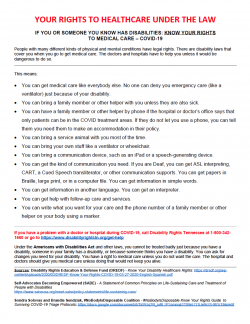 Know Your Healthcare Rights COVID-19
Know Your Healthcare Rights COVID-19
No one can deny emergency healthcare just because of a disability. We developed a one-page document affirming these rights.
If you have a problem with a doctor or hospital during COVID019, call Disability Rights Tennessee at 1-800-342-1660 or go to www.disabilityrightstn.org/get-help
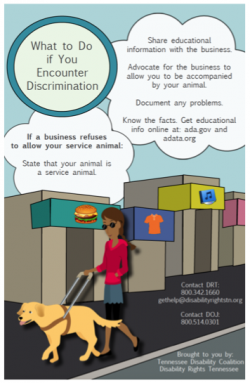 Service Animal Tip Card:
Service Animal Tip Card:
Individuals with disabilities may use service animals for a variety of reasons. Title II and Title II of the Americans with Disabilities Act (ADA) defines a service animal as any dog that is individually trained to do work or perform tasks for the benefit of an individual with a disability, including a physical, sensory, psychiatric, intellectual, or other mental disability.
Titles II and III of the ADA also make it clear that service animals are allowed in public places. Even if the business or facility has a “no pets” policy, a person with a service animal cannot be denied entrance. Service animals are not pets.
In 2013, a new law passed by the Tennessee General Assembly helped to bring service animal guidelines in our state in line with federal law.
The Tennesse Disability Coalition has partnered with Disability Rights Tennessee and a number of self advocates who use service animals to provide free trainings on service animal guidelines.
We have developed two ADA Tip Cards that provide a quick snapshot for individuals with disabilities who use a service animal and encounter discrimination, and for businesses and public facilities who are concerned that someone has entered their establishment with a dog that is not a service dog. We encourage you to print these tip cards on your own, or call us at: 615-383-9442 to request copies.
Tip Card: What to Do if You Encounter Discrimination
Download the .pdf
Download the .doc
Tip Card: What to Do If You Think Someone Has Brought in a Dog That is Not a Service Dog
For more information on service animal guidelines, check out the Service Animals and Emotional Support Animals Manual online at the ADA National Network site: https://adata.org/publication/service-animals-booklet
Employment and Community First CHOICES Program - Group 4
Family Feedback and Recommendations
by Sylvia Stenger, Occupational Therapy Doctoral Student at Belmont University
The Tennessee Disability Coalition surveyed families to find out strengths, weakness & recommendations for the program.